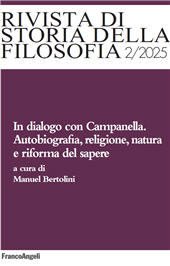Campanella tra Galileo e Brahe
238-262 p.
Campanella's wish to become a privileged interlocutor of Galileo on astronomy, cosmology and prophecy after the publication of Nuncius Sidereus in 1610 was frustrated by the unspoken but constant refusal of the latter to maintain a scientific correspondence with the friar detained in the Spanish jails of Naples, and to follow him on his theological and philosophical paths. Around 1611, Campanella started to study Brahe's works, and to regard his theories and observations as meaningful contributions to astronomy and astrology also in a prophetic perspective. He disagreed at the end with the Tyconic interpretation of the new stars and comets of his age as astrological signs of the coming defeat of the Catholic Church and its powers and of a new reform of Christianity, but he worked on the same prophetic sources, mainly the Sybilline Oracles, and treasured Brahe's corrections and critiques of some Copernican assertions, which Campanella saw as instrumental to the making of his own
elaboration of the apocalyptic traditions. Probably, Campanella's attitude towards Brahe and his criticism of Copernicus increased Galileo's detachment with regard to the former's prophetic speculations. Campanella's claim to integrate views and experiences of different astronomers in his metaphysical and prophetic vision of the world and its destiny surely sounded inconsistent with Galileo's science, and particularly with his rejection of Brahe's cosmology and explanations of new celestial phenomena. [Publisher's text]
Fait partie de
Rivista di storia della filosofia : LXXX, 2, 2025-
Articles du même numéro (disponibles individuellement)
-
Informations
Code DOI : 10.3280/SF2025-002005
ISSN: 1972-5558
KEYWORDS
- Tommaso Campanella, astrology, Sybilline oracles, prophecy, Copernican heliocentrism, Tyconic system


